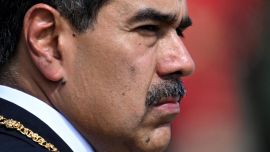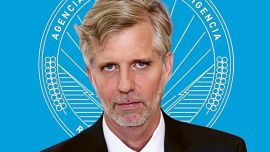The XXVIII Ibero-American Summit of Heads of State and Government opened Friday in the Dominican Republic with the announcement of a surprise special guest: Venezuelan President Nicolás Maduro.
Maduro, whose very legitimacy in office is questioned by Spain and other member nations of this forum, was not expected to attend the summit and though he missed the opening ceremony, diplomatic sources confirmed that he will attend later sessions
The meeting in Santo Domingo, which ran until Saturday, has an agenda focused on the difficult economic situation left behind by the Covid-19 pandemic. Conditions have worsened in the region amid the impact of Russia’s invasion of Ukraine and the forum aims to strengthen cooperation between Latin America and Europe in this challenging context.
President of the Dominican Republic, Luis Abinader, inaugurated proceedings at the Osama Fortress on Saturday, a beautiful colonial site facing the Caribbean Sea. He was accompanied by the King of Spain, Felipe VI, and nine other heads of state, including Argentina's President Alberto Fernández.
"It is urgent to rethink a fairer global financial system that allows us to invest in order to create the foundations for a green, equitable and true economic development," said Abinader in his speech.
The summit’s plenary session will be held on Saturday, when the leaders will sign a joint declaration.
Venezuelan complications
Maduro, who was absent from the opening ceremony, is due to take part in that debate. To surprise in the room, his arrival in Santo Domingo was announced by the master of ceremonies during the inauguration, noting the upcoming arrival of leaders.
It is the first time that Venezuela’s president has taken part in the event since coming to power in 2013, after the death of his mentor and predecessor, Hugo Chávez.
Maduro’s legitimacy has been questioned since his re-election in 2018 by much of Europe and several countries in the region, which have branded the process as fraudulent. At the 2021 Ibero-American Summit in Andorra, when Maduro was represented by his then-vice-president Delcy Rodríguez, Venezuela was the focus of a heated debate between world leaders.
Latin America has since experienced a shift to the left with countries such as Argentina, Chile, Colombia and Brazil shifting away from the right, improving the international outlook for Maduro. On the domestic front, Venezuela’s opposition lost strength, unity and failed to dislodge the president from power. Maduro will now seek a third six-year term in 2024.
Despite the improved outlook, the governments of Ecuador, Paraguay and Spain still refuse to formally recognise Maduro as Venezuela’s legitimate leader.
Neither El Salvador President Nayib Bukele nor Nicaragua President Daniel Ortega, both of whom have also criticised for growing authoritarianism and alleged human rights violations, are expected to attend this year’s Ibero-American Summit.
Difficult year
The leaders present at the forum are expected to sign a joint declaration on Saturday. It will include commitments to a “critical path for food security, inclusive and sustainable in Ibero-America,” as well as 'Ibero-American environmental charter', to help protect our habitat and oceans. An 'Ibero-American charter of principles and rights in digital environments,' to guarantee the exercise of fundamental rights in the framework of the digital transformation," has also been discussed, according to a statement from the organisation.
Latin America is facing a difficult year, with regional growth of two percent projected for this year. Costs are rising for citizens all over the continent – the cost of a healthy diet in the region is the most expensive in the world: US$3.89 dollars a day per person, a mark inaccessible to 22.5 percent of the population, according to the United Nations.
The Ibero-American Summit precedes the July meeting between the Community of Latin American and Caribbean States (CELAC) and the European Union (EU), which will be held on July 17 and 18 in Belgium.
"Economic recovery today more than ever needs cooperation", said Felipe VI at the end of a business meeting prior to the summit. "The commitment to Ibero-America is not going to disappoint.”
Overcoming the economic crisis that has hit part of the region depends on achieving political stability, amid severe political turbulence in countries such as Peru, Ecuador and Venezuela.
Ecuador's President Guillermo Lasso said Saturday that he was struggling, for example, with "a very blind opposition" that seeks to come to power "not through the vote, but through a parliamentary coup d'état," when an impeachment trial is being promoted against him.
Mariano De Alba, an analyst at the International Crisis Group, believes that migration will be a hot topic, but not the main one at the summit, and that it will be more of a bilateral issue.
"Latin America is experiencing one of the largest migrations in history," said Paraguayan President Mario Abdo Benítez, referring to the more than seven million Venezuelans who have left the country, according to the UN. "We cannot sweep this under the carpet.”
related news
by Javier Tovar & Esteban Rojas, AFP


























Comments